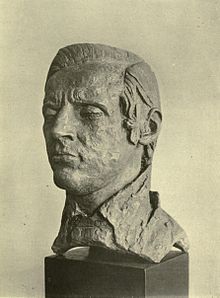Bernard van Dieren
| Bernard van Dieren | |
|---|---|

Bust of Bernard van Dieren, by Jacob Epstein
|
|
| Background information | |
| Birth name | Bernard Hélène Joseph van Dieren |
| Born |
27 December 1887 Rotterdam, Netherlands |
| Died | 24 April 1936 (aged 48) London, England |
| Occupation(s) | Musician, writer |
Bernard Hélène Joseph van Dieren (27 December 1887 – 24 April 1936) was a Dutch composer, critic, author, and writer on music, much of whose working life was spent in England.
Van Dieren was the last of five children of a Rotterdam wine merchant, Bernard Joseph van Dieren, and his second wife, Julie Françoise Adelle Labbé. Details of his education are unknown but it seems that his early training was as a scientist, as a research assistant in a laboratory. Gifted in science, extremely intelligent and with a phenomenal memory, he was also well-versed in literature as well as an able violinist and amateur artist. His career as composer began when he was twenty when some of his early works were published in the Netherlands. His early music was influenced by Delius.
In 1909 he relocated to London with his wife-to-be, Frida Kindler (1879–1964), a very gifted concert pianist whom he married on 1 January 1910. By this time he had decided to study music seriously. A son, Hans Jean Jules Maximilian Navarre Benvenuto Bernard van Dieren (1910–74), was born the same year.
He was largely self-taught, though he spent 1912 in Europe where he met the composers Busoni and Schoenberg. His early contact with the music world was as a musical correspondent for several European newspapers and periodicals. During the First World War he was for a short time involved in secret service in the Netherlands, as a cypher expert in the Intelligence Department.
He suffered most of his life from ill health and had numerous operations for kidney-related complaints. To relieve the recurring pain, morphine was prescribed, and it is thought that in later life he became addicted to the drug. Because of these recurring bouts of illness, his wife, a former pupil of Busoni, supported the family by teaching the piano and by giving recitals. They also relied on financial support from a group of admirers and friends, which included notable personalities such as Jacob Epstein, Osbert and Sacheverell Sitwell, Augustus John, Philip Heseltine (the composer Peter Warlock) and Cecil Gray. The latter two were especially drawn by his charismatic and powerful personality and gave untiring support for his cause by prompting performances and publication of his works. Heseltine made van Dieren his heir in his will, inspiring claims by Heseltine's son Nigel that van Dieren had murdered Heseltine.
...
Wikipedia
